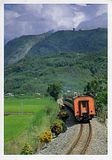

Aberystwyth is a historic market town, administrative centre and holiday resort within Ceredigion, Wales. It is often colloquially known as Aber, and is located at the confluence of the Rivers Ystwyth and Rheidol.
Aberystwyth since the late 19th century has also been a major Welsh educational centre, with the establishment of the first University in Wales in 1872. The permanent population is around 12.000, but for nine months of the year the 7.000 resident students associated with Aberystwyth University take this total to about 19.500 people.
Aberystwyth is a major tourist centre and a cultural link between North Wales and South Wales. Constitution Hill is scaled by the Aberystwyth Electric Cliff Railway giving access to fine views and other attractions at the top, while much of the finest scenery in Mid Wales lies within easy reach of the town. This includes the wilderness of the Cambrian Mountains, whose valleys contain forests and meadows which have changed little in centuries. A convenient way of reaching the interior is by the preserved narrow gauge Vale of Rheidol Railway.
Although the town is relatively modern, it contains a number of historic buildings, including the remains of the castle and the Old College of Aberystwyth University nearby. The Old College was originally intended to be a hotel, but due to a lack of funds the shell of the building was sold to the university. The new university campus overlooks Aberystwyth from Penglais Hill to the east of the town centre. The terminus for the standard gauge railway is also very impressive being built in 1924 in typical style of the period. The architecture is a mix of Gothic, Classical Revival and Victorian, and the town is sometimes referred to as "the Oxbridge of Wales".
The town is generally regarded as the capital of Mid Wales, and several institutions have regional or national offices there. Perhaps the most important of the public bodies located in Aberystwyth is the National Library of Wales. The library also incorporates the National Screen and Sound Archive of Wales, one of six British regional film archives. The Royal Commission on the Ancient and Historical Monuments of Wales, which maintains and curates the National Monuments Record of Wales (NMRW), provides the public with information about the built heritage of Wales. Aberystwyth is also the home to the national offices of UCAC and Cymdeithas yr Iaith Gymraeg, and the site of the Institute of Grassland and Environmental Research. The Welsh Books Council and the offices of the standard historical dictionary of Welsh, Geiriadur Prifysgol Cymru, are also located in Aberystwyth.

 The Postcard Store
The Postcard Store







.jpg)

























